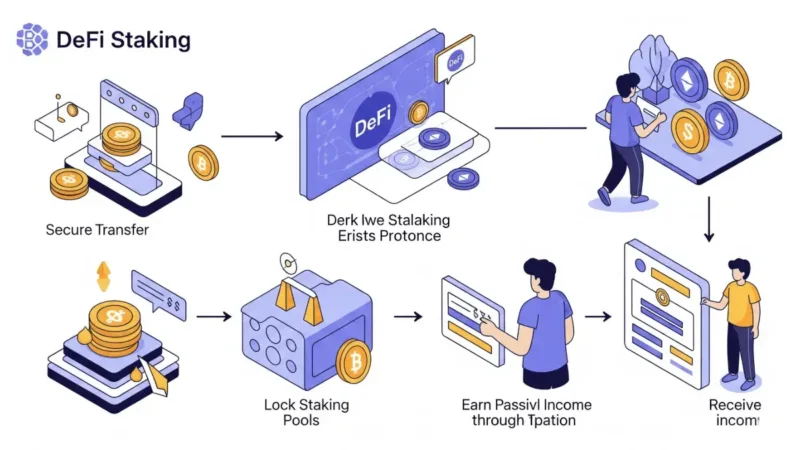FDIC Ditches “Reputational Risk” for Crypto Banks, Signaling End to Shadow Ban

In a landmark announcement that sent ripples of optimism through the cryptocurrency industry, prominent venture capitalist and tech entrepreneur David Sacks revealed on March 25, 2025, that the Federal Deposit Insurance Corporation (FDIC) has decided to eliminate “reputational risk” as a determining factor in the regulatory oversight of banks providing services to cryptocurrency businesses. This pivotal decision marks a significant departure from a long-standing, often criticized subjective standard that many in the digital asset space argued had effectively blocked legitimate crypto firms from accessing essential banking services.
“Reputational Risk”: A Long-Standing Barrier
The move by the FDIC is being hailed as a crucial step towards mainstreaming cryptocurrency adoption and fostering a more level playing field for innovative blockchain-based enterprises. For years, the specter of “reputational risk” has loomed large over banks considering engaging with cryptocurrency companies. This ambiguous and often ill-defined criterion allowed regulators to discourage or outright prevent banks from servicing crypto firms, even when those firms were operating within the bounds of existing laws and regulations.
The Problem with Subjectivity
The subjective nature of “reputational risk” made it a particularly problematic hurdle for the cryptocurrency industry. Unlike more objective metrics such as capital adequacy, liquidity ratios, and compliance with anti-money laundering (AML) and know-your-customer (KYC) regulations, “reputational risk” could be interpreted and applied arbitrarily. This created an environment of uncertainty and fear among banks, leading many to adopt a blanket policy of de-risking, effectively cutting off cryptocurrency businesses from the traditional financial system.
Echoes of “Operation Choke Point 2.0”
This de-risking phenomenon, often referred to within the industry as a continuation of “Operation Choke Point 2.0” (a reference to a controversial Obama-era initiative targeting businesses deemed “high-risk”), had severe consequences for cryptocurrency companies. Without access to basic banking services such as deposit accounts, payment processing, and lending facilities, these firms faced significant operational challenges, hindering their growth and innovation. Many were forced to rely on less regulated or offshore entities, increasing their own risk profiles and further complicating regulatory oversight.
David Sacks’ Announcement and Industry Reaction
David Sacks, a vocal advocate for the cryptocurrency industry and a critic of what he perceived as regulatory overreach, took to social media to share the news, framing it as a major victory for the digital asset space. His announcement was met with widespread approval from industry leaders, entrepreneurs, and investors who have long argued that the “reputational risk” standard was an unfair and discriminatory barrier to entry.
Alignment with Calls for Objective Assessment
The FDIC’s decision to eliminate “reputational risk” as a primary regulatory concern aligns with growing calls for a more objective and data-driven approach to overseeing the cryptocurrency industry. Proponents of this change have consistently argued that regulatory scrutiny should focus on verifiable compliance with established legal and financial standards, rather than subjective assessments of perceived reputational harm.
Potential for Broader Banking Access
This shift in FDIC policy could have far-reaching implications for the cryptocurrency ecosystem. By removing a significant barrier to banking access, it is expected that more traditional financial institutions will be willing to engage with cryptocurrency companies. This increased access to banking services could lead to greater stability, transparency, and legitimacy for the industry as a whole.
Fostering Innovation and Growth
Furthermore, it could foster innovation by allowing cryptocurrency businesses to operate more efficiently and invest in growth without the constant threat of being de-banked. It could also pave the way for the development of new financial products and services that bridge the gap between traditional finance and the digital asset space.
Continued Focus on Objective Compliance
The elimination of “reputational risk” as a key regulatory factor does not mean that cryptocurrency businesses will be exempt from scrutiny. Banks will still be expected to conduct thorough due diligence on their crypto clients, ensuring compliance with all applicable laws and regulations, including AML and KYC requirements. However, the focus will now shift to these objective criteria, providing a more predictable and transparent framework for both banks and cryptocurrency companies.
Potential Influence on Other Regulatory Bodies
Industry analysts believe that this move by the FDIC could also influence other regulatory bodies to adopt a more objective approach to cryptocurrency oversight. The United States has been under pressure to provide clearer and more consistent regulations for the digital asset industry to foster innovation and maintain its competitive edge in the global financial landscape. The FDIC’s decision could serve as a positive precedent, encouraging other agencies to re-evaluate their own policies and move away from subjective standards like “reputational risk.”
Cautious Optimism and Future Implications
The long-term impact of this policy change remains to be seen, but the initial reaction from the cryptocurrency industry has been overwhelmingly positive. Many believe that this marks a turning point in the relationship between traditional finance and the digital asset space, potentially ushering in an era of greater collaboration and integration.
Not a Universal Embrace, but a Significant Step
However, some caution that the elimination of “reputational risk” as a formal regulatory factor does not necessarily guarantee that all banks will suddenly embrace cryptocurrency clients. Some institutions may still be hesitant due to their own internal risk assessments or concerns about the volatility and evolving nature of the cryptocurrency market. It will likely take time for the full effects of this policy change to be realized.
A Clearer Pathway for Legitimate Businesses
Despite these potential caveats, the FDIC’s decision to move away from “reputational risk” is undoubtedly a significant step forward for the cryptocurrency industry. It addresses a long-standing grievance and provides a clearer pathway for legitimate crypto businesses to access the essential banking services they need to thrive. By focusing on objective, verifiable criteria, the FDIC is signaling a commitment to a more rational and evidence-based approach to regulating the intersection of traditional finance and the rapidly evolving world of digital assets.
Wider Implications for the Crypto Ecosystem
The implications of this policy shift extend beyond just banking access. Greater integration with the traditional financial system could lead to increased institutional investment in cryptocurrencies, further driving adoption and market maturity. It could also facilitate the development of more user-friendly and accessible cryptocurrency products and services for retail investors.
Enhanced Regulatory Visibility and Risk Mitigation
Moreover, a more stable and regulated environment could help to address some of the concerns that have been raised about the potential risks associated with cryptocurrencies, such as their use in illicit activities. By bringing more cryptocurrency businesses into the regulated financial system, authorities will have greater visibility and the ability to monitor and prevent illicit transactions.
Reflecting Industry Maturity and Influence
The decision by the FDIC to eliminate “reputational risk” as a regulatory factor is a testament to the growing maturity and influence of the cryptocurrency industry. It reflects a recognition that digital assets are not a fringe phenomenon but an increasingly important part of the global financial landscape. As the industry continues to evolve and innovate, it is crucial that regulatory frameworks adapt to keep pace, fostering innovation while ensuring consumer protection and financial stability.
Potential for International Influence
This move by the FDIC could also have international implications, potentially influencing how other countries regulate the relationship between banks and cryptocurrency businesses. A more objective and principles-based approach to regulation could help to create a more consistent and predictable global landscape for the digital asset industry.
Stay informed, read the latest crypto news in real time!
Conclusion: A Brighter Future for Crypto
In conclusion, the announcement by David Sacks that the FDIC will no longer consider “reputational risk” in its regulation of banks servicing cryptocurrency businesses is a watershed moment for the industry. It represents a significant victory for advocates who have long argued for a more objective and fair approach to regulatory oversight. While challenges remain, this policy change has the potential to unlock significant opportunities for growth, innovation, and mainstream adoption of cryptocurrencies. By dismantling a subjective barrier that has long hindered the industry, the FDIC is signaling a new era of engagement between traditional finance and the digital asset space, one that is based on clear rules, objective standards, and a recognition of the transformative potential of blockchain technology. The elimination of “reputational risk” is a welcome development that promises a brighter future for the cryptocurrency ecosystem.





